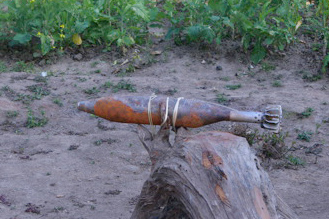In the Phong Dien Nature Reserve in central Vietnam, an unlikely resource is hindering formal conservation efforts. Deep in the forest, villagers scavenge for scrap metal left during the Vietnam War. Unprecedented research from the Center for International Forestry Research (CIFOR) and the Institute of Tropical Forest Conservation (ITFC) finds scrap metal gathering is a primary driver in forest degradation and trade in non-timber forest products in Vietnam.
The Khe Tran village lies adjacent to the Phong Dien protected area, where logging and hunting have been prohibited since 1992. The extraction of non-timber forest products (NTFPs) is still permitted, and collectors earn roughly $62 a year scavenging metal, around one-twelfth the mean annual income of surveyed households. In Vietnam, scrap metal is a “backbone product,” meaning it influences markets for other forest products. Traders who purchase metal also will purchase rattan, bamboo, or eaglewood from metal collectors.
Because unexploded ordinance is a threat to metal collectors, collectors minimize risk by torching areas of the forest to increase visibility and detonate mines from a distance. As a result, fire has greatly contributed to the degradation of forests and farmland around Khe Tran village and in the Nature Reserve.
 Under-appreciated threat to conservation in Vietnam. Photo by Rhett A. Butler |
To encourage forest protection, policy makers must understand how local peoples use the forest and what risks their activities pose to long-term conservation. Collecting metal is the primary reason villagers enter the forest, yet they broaden their impact by collecting other forest products—including some threatened species, say CIFOR researchers. As metal becomes scarcer, those dependant on this artificial forest resource could diversify their incomes through timber harvest or the animal trade.
The government has sought to reduce rural reliance on forests by encouraging plantation crop in the place of shifting cultivation. With increased reliable incomes from plantations, and the growing scarcity of metal scavenged from the forest, most villagers in Khe Tran no longer depend on forest metal for their main income. However, members of the nearby Phong Son Commune and other neighboring areas still are reliant on scrap metal as land scarcity has precluded farming alternatives.
The people of Khe Tran have requested formal recognition of their rights to the forest. Perhaps to ensure limited outside access to forest resources, the population of Khe Tran has expressed interest in assisting authorities with conservation goals by monitoring and patrolling the Phong Dien Nature Reserve. As in common in the developing world, government conservation resources are spread thin: only eight rangers patrol the 40,000-hectare protected area.
When war metal becomes too sparse to merit collecting, the poorest and most vulnerable members of Vietnam’s rural communities will be in need of alternative livelihood options, and researchers fear further degrading activates should effective policies to protect the forest while providing income-generating activities is not met.